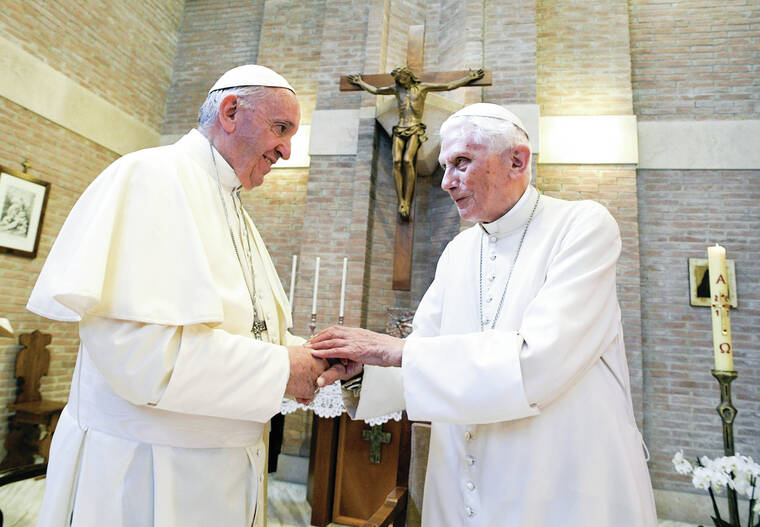Pope exposes confidential details of past conclaves and settles scores with Pope Benedict XVI’s aide
VATICAN CITY — Pope Francis has exposed the political “maneuvers” used to sway votes during the two most recent elections of popes, while denying he is planning to reform the process for future conclaves, in a book-length interview published Tuesday.
The confidential revelations are contained in “The Successor: My Memories of Benedict XVI,” in which the Argentine pope reflects on his relationship with the late German pope and settles some scores with Benedict’s longtime aide.
ADVERTISING
The book, written as a conversation with the correspondent for Spain’s ABC daily, Javier Martínez-Brocal, comes at a delicate time for the 87-year-old Francis. His frail health has raised questions about how much longer he will remain pope, whether he might follow in Benedict’s footsteps and resign, and who might eventually replace him.
In the book, Francis revealed previously confidential details about the 2005 conclave that elected Benedict pope and the 2013 ballot in which he himself was elected, saying he was allowed to deviate from the cardinals’ oath of secrecy because he is pope.
In 2005, Francis said, he was “used” by cardinals who wanted to block the election of Benedict — then Cardinal Joseph Ratzinger — and that they managed to sway 40 out of 115 votes his way. The idea wasn’t to elect the Argentine but rather to force a compromise candidate after knocking Ratzinger out of the running, he said.
“They told me afterward that they didn’t want a ‘foreign’ pope,” — in other words, a non-Italian one — Francis said, making clear that the process wasn’t so much about the Holy Spirit inspiring cardinals as it was a cold, hard political calculus.
Francis said he put an end to the maneuvering by announcing that he wouldn’t accept being pope, after which Ratzinger was elected.
“He was the only one who could be pope in that moment,” Francis said, adding that he, too, voted for Ratzinger.
In 2013, after Benedict’s resignation, there was also political maneuvering involved. Francis — who at the time was Cardinal Jorge Mario Bergoglio — said he only realized after the fact that cardinals were coalescing behind him, pestering him with questions about the church in Latin America and dropping hints that he was gaining support.
In the book, Francis also settles some scores with Benedict’s longtime secretary, Archbishop Georg Gaenswein, whom he initially fired and then exiled from the Vatican after what he described as a series of imprudent decisions that “made life difficult for me.”
Gaenswein is widely believed to have helped fuel the anti-Francis opposition during Benedict’s decade-long retirement, allowing Benedict to be used by conservatives nostalgic for his doctrinaire papacy. He was behind some of the biggest hiccups in the unusual cohabitation of two popes.
Francis reveals details about one well-known incident in 2020, in which Cardinal Robert Sarah, the conservative former Vatican liturgy chief, co-authored a book with Benedict reasserting the need for a celibate priesthood.
The book was published at the precise moment Francis was considering calls to relax celibacy requirements and allow married priests in order to address a shortage of clergy in the Amazon. It caused a stir because Benedict’s participation in the book raised the prospect of the former pope trying to influence the decision-making of a current one.
Francis squarely blames Gaenswein for the affair, insisting that Sarah was a “good man” who perhaps was “manipulated by separatist groups.” Francis said he felt compelled to sideline Gaenswein after the ruckus.
“I was obliged to ask Benedict’s secretary to take a voluntary leave, but keeping the title of prefect of the papal household and the salary,” Francis said.


